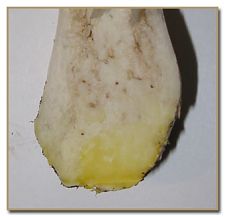Agaricus xanthodermus
Order Agaricales, family Agaricaceae CAP MOSTLY WHITE, SOMEWHAT ANGULAR WHEN YOUNG Cap: 5 - 20 cm wide; at first somewhat square-shaped (resembling marshmallows), rounding and changing from convex to flat with age; mostly smooth and white, buff at center; strong odor of phenol. Bruises yellow, then turns brownish. GILLS PINK-GRAY THEN CHOCOLATE Gills: free; crowded; white then pink-gray then chocolate brown STALK WITH YELLOW FLESH AT THE EXTREME BASE
Ring: partial veil thick with patches on underside, leaving large ring on stalk SPORE PRINT CHOCOLATE-BROWN Spores 4.5-6 x 3.5-4.5 µm, elliptical, smooth IN FLOWER BEDS OR ON LAWN, often in large numbers POISONOUS Lookalikes: Urban mushroom (A.bitorquis) -- no odor or yellow stain Meadow mushroom (A. campestris) -- often smaller, no odor or yellow stain Vomiter (Chlorophyllum molybdites) -- green spores
Commentblog comments powered by Disqus |
 |
 Yellow Foot Agaricus
Yellow Foot Agaricus Stalk: 4-18 cm long, 2-3 cm thick; bright yellow flesh at extreme base when cut
Stalk: 4-18 cm long, 2-3 cm thick; bright yellow flesh at extreme base when cut